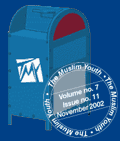I'tikaf means staying in the Masjid (Mosque) with the
intension of drawing himself closer to Allah. The Prophet, peace be upon him,
used to stay in the Masjid the last ten days of Ramadan until he died, then his
wives used to to do the same after him. (Bukhari and Muslim).
The time to begin I'tikaf:
The Prophet, peace be upon him, if intended to perform I'tikaf,
used to pray Fajr, then enter the area he set aside for I'tikaf in the Masjid.
(Bukhari and Muslim).
Necessary conditions for practicing I'tikaf:
- The person should be Muslim.
- Having reached the age of discerment.
- Purified from janaba and menses and post-partum bleeding.
The basic element of I'tikaf: Staying in
the Masjed with intension of getting closer to Allah.
- Going out for the place of I'tikaf to bid farewell to his family.
- Combing his hair, shaving his heaad, clipping nails, cleaning his body,
perfuming, and wearing the best clothing.
- To go out of the Masjid for pressing necessities like using the toilet, or to
eat and drink, if no one brings his food.
- It is permitted to eat and drink and sleep in the Masjid with the proper care
taken to maintain it cleanliness.
The Sunnah for one in I'tikaf is not to leave the masjid to visit
the sick, nor attend a burial, not to touch a woman nor to have sex with wife, and to
leave the masjid except for unavoidable need, and there is no I'tikaf with out fasting;
and there is no I'tikaf except in the Masjid where Jumu'ah (Friday prayer) is established.
(Baihaqi and Abu Dawud).
Things which nullify I'tikaf:
- Leaving the Masjid without need, intentionally.
- Losing one's rationality through insanity of drunkenness.
- Menstruation and post-partum bleeding.
(Source: Mohammad bin Jamil Zeno, The Pillars of Islam & Iman.
Dar-us-Salam Publications, Riyadh, K.S.A.)
|










